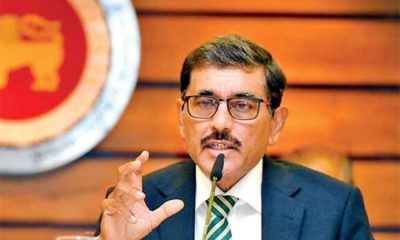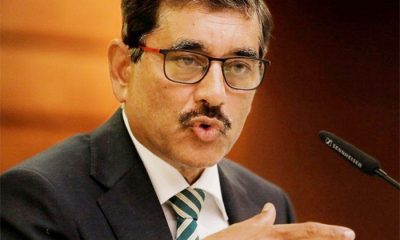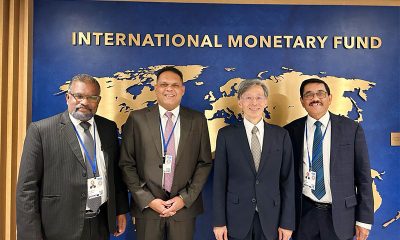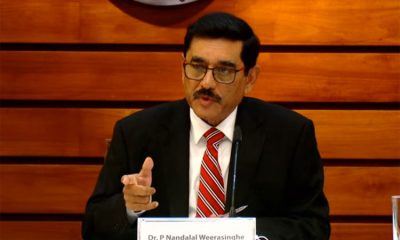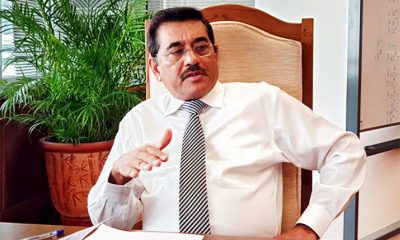Business
‘Organised defaulters’ may make bank loans harder for genuine businesses
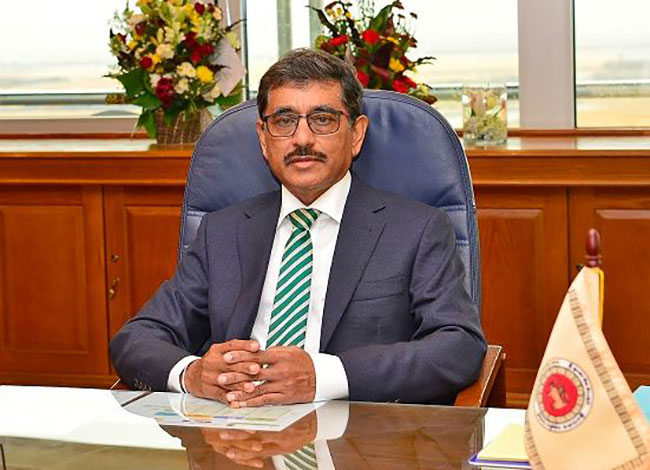
By Sanath Nanayakkare
Officials of the Central Bank have to grapple with ‘growth versus inflation’ dynamics to determine Sri Lanka’s economic future in another challenging New Year which has just begun. In addition to that they have found another unenviable task in encountering vociferous opponents of the banking system’s parate execution which is apparently being enforced as a last resort.
This was evident during the Q& A session the media had with Central Bank Governor Dr. Nandalal Weerasinghe on Friday where the Bank released its first-ever Financial Stability Review after gaining independence from Sri Lanka’s elected officials.
“A handful of organized loan defaulters are engaged in a vociferous campaign these days to avoid repaying loans they have taken from the banking system. But the Central Bank has a duty to recover the depositors’ money which has been lent to them, or else, the banks may become reluctant to loan money to even good borrowers in the future”, Dr. Weerasinghe warned.
“The Central Bank’s view is that parate execution is more important and essential for the protection of depositors’ money than for the stability of the banking system. The banking system distributes deposit funds of the general public among businesses as loans to stimulate the economy. However, when one borrows money from that deposit base and not repay it, the depositor’s money is at risk,” he said.
The Governor pointed out that the entire banking system has a deposit base of Rs. 16 trillion and depositors’ money account for 81% of the banking system’s liabilities.
“Bank shareholders have only a stake of 7% in this deposit base. So if any borrowers say that the money they have borrowed can’t be repaid or shouldn’t be recovered under parate execution, it is an unjustifiable claim. Now we hear the voices of an organized group that have the capacity to afford formal media events and say their defaulted loans shouldn’t be recovered under parate execution. This is akin to telling the depositors that ‘we have borrowed your money but we can’t pay it back.” If the depositors agree to that, it’s justifiable.
But the depositors won’t agree to that. The depositors are a silent majority community and their voices are not heard. Parate execution is enforced only when borrowers default on their loans; it is not enforced on those who make suitable arrangements to repay their loans. When the banks can’t recoup its losses under parate execution; they would be reluctant to give loans in the future even if one provides a property as collateral for repayment. So, the Central Bank has a responsibility to recover the money that belongs to the general public. If anyone is trying to disrupt the process, it’s a violation of depositors’ rights,” he said.
The governor pointed out that mainly short term deposits are used in giving long term loans and in the past 11 months, parate execution has been enforced on 557 persons recovering Rs. 38 billion.
“At a glance, it appears to be a big sum of money. But that is only 0.4% of the total bank loan portfolio. At present Stage-3 impaired loans stand at 13% which is a sum of Rs.1.4 trillion. Out of Rs. 1.4 trillion worth impaired loans, Rs. 38 billion came from parate executions. This means only 2.7% has been recovered under parate executions. If the banking system finds it unable to keep the enforcement of parate execution in effect, it will be a great injustice to the depositors because their money is borrowed and not repaid. Also, it will be an injustice to potential genuine borrowers because banks will be reluctant to give them money on credit.”
“These days you hear the voice of defaulters who make statements against parate execution at media events they have organized. And you will only see the depositors come to the picture when they find their savings are used in messy transactions. ETI, Golden Key and The Finance are good examples for this where depositors finally grouped up to make their collective voice heard. So, if the savings of millions of innocent people are misapplied by a handful of people and if they band together to prevent parate execution from being enforced, I think it would be great injustice.”
“The economic crisis brought its consequences without sparing anyone; not only borrowers, depositors were affected too. When inflation was 70%, depositors got a maximum interest rate of about 25%. That is how borrowers had to pay 30% interest rate. The Central Bank has issued 8 circulars with effect to giving crisis-hit businesses necessary moratoriums, relief measures, spreading out repayments, SME loans from ADB etc. And if the borrowers still have any grievances against their respective banks, there is a separate unit at the Central Bank to discuss such issues and see if a particular bank is deviating from the given norms.”
“But if it is identified that someone is shirking repayments, it is our duty to recover that money on behalf of the depositors and taxpayers because in the event of a crisis in the banking system, it will need to be borne by taxpayers and depositors,” he said.
The Governor went on to defend the banks making a decent profit through the activity of deposit taking, deposit interest payments and lending money at market rates throughout a financial year while robustly supporting the economy.
“When a bank makes profits, it has more capital to give as loans. That is why Rs. 450 bn has been allocated by the Budget from taxpayers’ money to strengthen the capital position of the state banks”, he pointed out.
The Governor urged sections of the media to not only highlight the story of the loan defaulters but also to train their cameras at the depositors and taxpayers.
“Are taxpayers willing to pay more taxes to give relief to a handful of loan defaulters or are depositors willing to sacrifice their funds to give relief to loan defaulters? That is the fundamental question we have before us and the general public needs to be made aware of it,” the Governor said.
Business
Colombo Tea Auction: BOP struggles while lower-grade teas gain

Analysts see budget-conscious international buying amid global economic pressures
This week’s Sri Lanka tea auction recorded the highest volume since February, with total offerings reaching 6.45 million kilograms (M/Kgs). However, the market displayed a mixed performance, with high-quality Broken Orange Pekoe (BOP) varieties facing price declines while lower-end teas saw appreciation.
Select Western BOP/BOPF teas, typically among the most sought-after, dropped by over Rs. 100 per kg, while others in the category saw smaller declines. Nuwara Eliya BOPs, known for their delicate flavor were mostly unsold, and when sold, fetched up to Rs. 200 per kg less than previous levels. Uva BOPs also declined by up to Rs. 50 per kg, reflecting weaker demand for premium liquoring teas.
In contrast, teas at the lower end of the market fared better. Below Best BOPs remained steady, while BOPFs in the same category fell by Rs. 50 per kg or more, influenced by inconsistent quality. Meanwhile, Low Grown PF1s (CTC grade) saw a firmer trend, with some appreciation in value.
The Leafy and Semi-Leafy sector saw Select Best BOP1s maintain stable prices, while OP1s (Orange Pekoe) were irregular—well-made varieties eased, but others appreciated. In the Tippy segment, high-priced FBOPs dipped, but Best and Below Best grades held firm, with the lowest-end teas gaining value.
Despite price corrections, all categories met fair demand, with Low Growns dominating at 2.6 M/Kgs. The Premium catalogue showed selective firmness for very tippy teas, while others eased or declined.
Analysts suggest that the dip in high-quality teas may reflect subdued demand from key export markets, while the resilience of lower-grade teas indicates steady domestic and budget-conscious international buying.
“With global economic pressures persisting, auction trends may continue fluctuating in the coming weeks,” they said.
– Reported using data from Forbes & Walker Tea Brokers
By Sanath Nanayakkare
Business
CBSL releases publication on financial statements for 2024
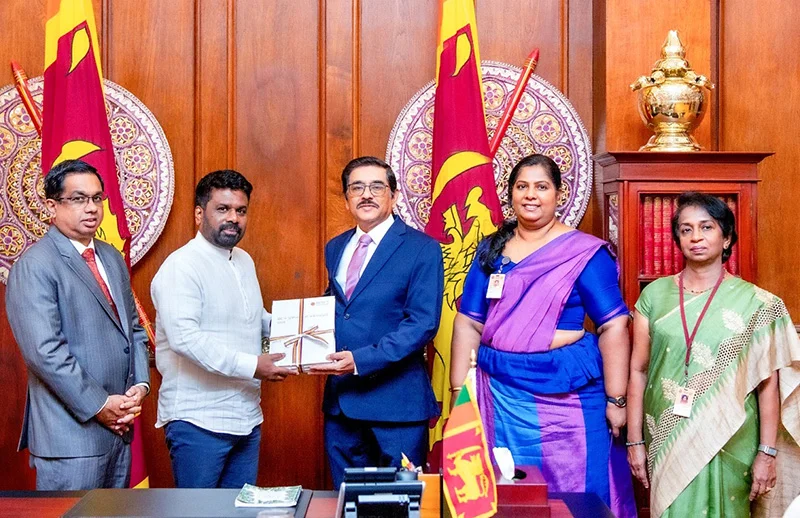
The publication on the Financial Statements and Operations of the Central Bank of Sri Lanka 2024, a requirement under Section 99(2) of the Central Bank of Sri Lanka Act, No 16 of 2023, was presented to the President and the Minister of Finance, Planning and Economic Development, Anura Kumara Dissanayake, by Dr. Nandalal Weerasinghe, the Governor of the Central Bank of Sri Lanka, 29 April.
Dr. N S Kumanayake, Secretary to the President, Ms. Lasanthi Sirimanne, Chief Accountant and Ms. Samudra Jayasundera, Director Policy Review and Monitoring Department of the Central Bank were also present at this occasion.
The Financial Statements and Operations of the Central Bank of Sri Lanka 2024 present an overview of the Central Bank’s institutional performance during the year 2024. The publication is structured into three main components: Operational Insights, Financial Statements, and Supplementary Information.
The Operational Insights section outlines the Central Bank’s strategy and its core responsibilities, including maintaining domestic price stability, ensuring financial system stability, overseeing payment and settlement systems, managing currency issuance, and strategic communication. This section also covers the Bank’s international engagements, the execution of other entrusted responsibilities including agency functions, and internal management arrangements.
The Financial Statements section presents the IFRS-compliant financial statements of the Central Bank of Sri Lanka for the year ended 31 December 2024, along with the independent report of the Auditor General. This segment also includes a financial review, providing an analysis of the Bank’s financial performance during the year.
The Supplementary Information section provides details on the Bank’s regional presence, the list of institutions regulated and supervised by the Central Bank, and a summary of corporate information.
The interactive PDF of this publication can be accessed through; https://www.cbsl.gov.lk/en/publications/economic-and-financial-reports/financial-statements-operations
Business
Emirates deepens strategic partnership with Sri Lanka Tourism Promotion Bureau to support local travel industry

At the Arabian Travel Market 2025, Emirates and the Sri Lanka Tourism Promotion Bureau (SLTPB) have renewed their partnership aimed at further developing the country’s tourism and trade industries. The partnership was sealed through a Memorandum of Understanding (MoU) between the two parties.
The MoU was signed by Essa Sulaiman Ahmad, Emirates’ Senior Vice President of Commercial West Asia & Indian Ocean and Sampath Nissanka, Managing Director – Sri Lanka Tourism Promotion Bureau. The signing ceremony was also attended by Adnan Kazim, Emirates’ Deputy President and Chief Commercial Officer; Alexi Gunasekera, Consul General-designate of Sri Lanka to Dubai and the Northern Emirates in addition to other representatives of the airline and tourism board.
First inked in 2022, the renewed MoU will strengthen the collaboration between Emirates and SLTPB, with both the airline and tourism body reiterating their commitment to actively promote Sri Lanka as a destination to key markets within Emirates’ network.
Through joint initiatives, such as developing excursions and familiarization trips to promote the island nation to key feeder markets, Emirates and SLTPB aim to grow the tourism industry of the popular Indian Ocean destination by showcasing the destination to customers across the airline’s global network.
The joint efforts to boost the nation’s tourist industry have supported a steady increase in inbound traffic into the island, which recorded just over 2 million visitors in 2024. Between April 2024 and March 2025, Emirates carried over 240,000 passengers into Sri Lanka from key markets around its network including Russia, the UK, Germany, Australia, China, and the US, among others.
-

 Business4 days ago
Business4 days agoPick My Pet wins Best Pet Boarding and Grooming Facilitator award
-

 News4 days ago
News4 days agoNew Lankan HC to Australia assumes duties
-

 News4 days ago
News4 days agoLankan ‘snow-white’ monkeys become a magnet for tourists
-

 News2 days ago
News2 days agoJapan-funded anti-corruption project launched again
-

 Features4 days ago
Features4 days agoKing Donald and the executive presidency
-

 Business4 days ago
Business4 days agoACHE Honoured as best institute for American-standard education
-

 Features6 days ago
Features6 days agoThe Truth will set us free – I
-

 Business2 days ago
Business2 days agoNational Savings Bank appoints Ajith Akmeemana,Chief Financial Officer



